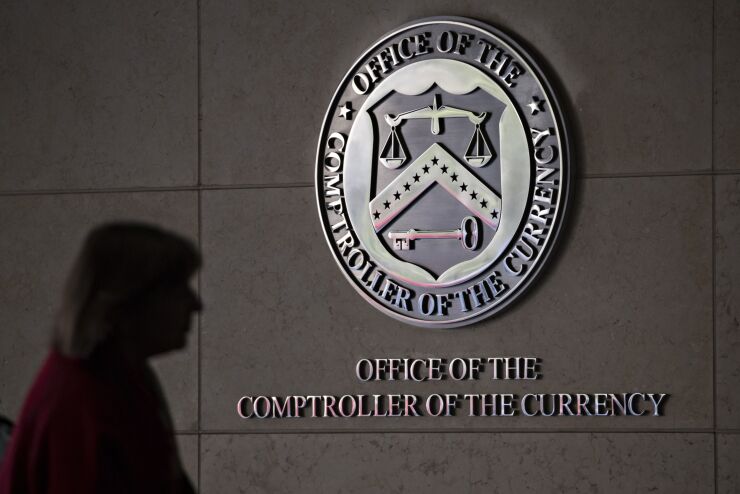WASHINGTON — As President Biden took office in January, leadership vacancies atop the Consumer Financial Protection Bureau and Office of the Comptroller of the Currency were seen as opportunities for the new administration to have an immediate impact on financial regulation.
While the White House moved fast to name an acting CFPB director and nominate a permanent head of the bureau, it has failed to appoint even an interim OCC chief. Three months into the president's term, analysts say the administration is losing time if it intends to unwind Trump policies.
“The vacancy at the OCC has gone on too long,” said Aaron Klein, a senior fellow at the Brookings Institution. “The result is an agency that remains on autopilot from the Trump administration.”
Brian Brooks, the outspoken former acting comptroller appointed by former President Donald Trump, left in January. The baton then went to Blake Paulson. A former OCC examiner, Paulson has largely kept a low profile, but a recent action has alarmed progressives who suggest he may be trying to keep Brooks's agenda in place.
“I've been told there have been some decisions along the way that suggest Paulson was very much sympathetic to the Brian Brooks approach … [and] that Paulson was continuing to sort of operate as if Brian Brooks is still there,” said a financial services lobbyist who spoke on the condition of anonymity.
Earlier this month, Paulson sent a letter to congressional leaders urging them not to invalidate a Brooks policy known as the "true lender" rule, which consumer groups say enables nonbanks to evade regulatory scrutiny. The letter was

Nominating a permanent comptroller has been complicated by an intraparty dispute among Democrats. The early favorite, former Treasury Department official Michael Barr, drew opposition from Senate Banking Committee Chairman Sherrod Brown. Mehrsa Baradaran, a law professor at the University of California, Irvine, has also been mentioned as a contender, but the position remains in limbo.
Most legal experts agree the administration could have named its own acting comptroller on day one. As the delay has dragged into its fourth month, analysts say the lack of action is inexplicable. The OCC is technically a bureau of the Treasury Department, and in the absence of Senate confirmation, the title of acting comptroller would fall to whomever is designated by Secretary Janet Yellen as the agency's "first deputy comptroller."
“It's just the most bizarre situation ... that people have seen in a long, long time,” said the financial services lobbyist. “I don't have a good explanation for why, and no one else does either.”
Others say that given how long it can take to confirm a nominee, the White House is losing precious time to influence regulatory policy. Many of the key rulemakings on the agenda, including an interagency effort to reform the Community Reinvestment Act, could take years.
Democrats universally opposed the CRA rule finalized by former Comptroller Joseph Otting. Though the heads of the other agencies have appeared willing to come back to the negotiating table to develop a universal rule, the lack of an OCC leader with the administration's backing slows down that process.
“There’s a sluggishness in reversing course,” said Jeff Hauser, executive director of the Revolving Door Project. “Regulation is time-consuming.”
In the months leading up to the Biden administration, some analysts predicted that the next policymaker appointed to lead the OCC — an agency responsible for supervising roughly 70% of the U.S. banking system — could have a near-immediate impact on the nation’s financial policy.
Paulson has at times appeared just to want to keep the seat warm.
Besides ensuring safety and soundness of the financial sector, “the next thing I’m really charged with is providing a smooth transition when we do get the next comptroller, whenever that comes,” Paulson said during a virtual conference hosted by the Consumer Bankers Association earlier this month.
“I really have told our staff from the beginning: I'm not intending to start a lot of new initiatives or make any significant changes in how we've been operating,” Paulson added, “but deal with issues as they come up, work closely with our interagency partners, and not ... [try] to create new controversies or take on anything — sort of cleaning the plate in this transition period is really my focus.”
But Paulson’s success in avoiding controversy may have come to end.
The acting comptroller earlier this month sent a letter to Congress asking Democrats to reconsider a plan to overturn the OCC’s true- lender rule, which consumer groups and their allies have argued could make it easier for predatory lenders to partner with banks and avoid state interest rate caps.
"Disapproval of the rule would return bank lending relationships to the previous state of legal and regulatory uncertainty, which ... adversely affects the function of secondary markets and restricts the availability of credit," Paulson reportedly said.
The financial services lobbyist said Paulson's letter on the true-lender rule may motivate the administration to move more quickly on naming its own acting comptroller.
“This might be what finally spins everyone up enough to really press the administration even more and say: ‘Enough is enough. Just name a new acting director, just pick somebody who we can trust,' " the lobbyist said. "There has to be some career lawyers at the OCC that people know well, that they would be confident that at a minimum to be 100% neutral.”
Some analysts, including former OCC personnel, noted that Paulson’s advocacy of the “true lender” rule was not particularly strange, given the agency’s historic approach to the policy area.
“This most recent letter that the acting comptroller sent may seem uncharacteristic for him,” said Dan Stipano, a partner at Davis Polk and a former OCC attorney. “But it's consistent with long standing positions that the agency has taken in this area.”
“This has caused uncertainty in the credit markets ever since the Madden case,” Stipano added. “What OCC is trying to say is that, regardless of our regulation, national banks can export interest rates as a matter of law. … They're trying to create some certainty in an area where there has been uncertainty because of Madden.”
An OCC spokesperson said it is common for the agency to have such correspondence with congressional leaders.
“The OCC routinely provides letters, briefings, and other information clarifying the agency’s position on rules and regulatory actions, both in response to Congressional requests and proactively to dispel misperceptions regarding agency actions," OCC spokesperson Bryan Hubbard said in an email. "The April 14 letters were provided to majority and minority Congressional and Committee leadership, including Chairman Brown, for them to consider as they weigh their actions related to the resolutions under the Congressional Review Act that were introduced to overturn the rule."
But other analysts say the episode has shone a harsh light on the risks that the Biden administration has invited by failing to appoint its own acting comptroller.
“There wasn’t an urgency around it,” said Isaac Boltansky, director of policy research for Compass Point Research & Trading, referring to Paulson’s early stewardship of the OCC. “He wasn’t in the headlines, handing out bank charters like Chiclets, or doing anything that would put the OCC on the top of someone’s to-do list at the White House.”
“I think that has obviously changed,” Boltansky added.
Hauser said the administration's inability to name an interim comptroller of the currency has not been an isolated phenomenon.
“This is something we’re seeing across the executive branch right now — this approach of, ‘I can’t make a decision right now, so I’ll stick with who I inherited,” Hauser said. “It’s an unforced error, and it's a characteristic of the Biden administration.”
Yet the administration did move very quickly in selecting new leadership for the CFPB.
Even as Biden nominee Rohit Chopra awaits Senate confirmation to lead the bureau, acting Director Dave Uejio has signaled that more enforcement is coming. He's also vowed to crack down on
“By the time Rohit gets in the chair [to lead the CFPB], the car’s been warmed up and already moving down the road,” Boltansky said. “But at the OCC, Paulson’s described as a caretaker. He’s not moving at all, and that has real-world implications.”
Others said that even if the administration remains conflicted about whom it will nominate to lead the OCC, getting an interim acting comptroller in office would go a long way toward making up time.
“Think about how many regulatory priorities from the Trump years are subject to [the Congressional Review Act] because they didn’t get done until the very end of his term, and how many aspects of the Obama years were subject to the CRA because they came in the last 60 days of his two terms,” said Hauser. “Every month counts in the regulatory process.”
“There are processes that can be begun by an interim person, where the final more complicated decisions could be delayed until you had a Senate-confirmed nominee,” Hauser continued. “To empower the nominee, you need to be gearing up for decisions coming down a year or two from now.”
In the meantime, analysts say, the clock keeps ticking.
“Failure to act is itself an action," Klein said. “Not naming a comptroller is an action that has consequences. Sometimes what’s not happening is as important as what is.”




